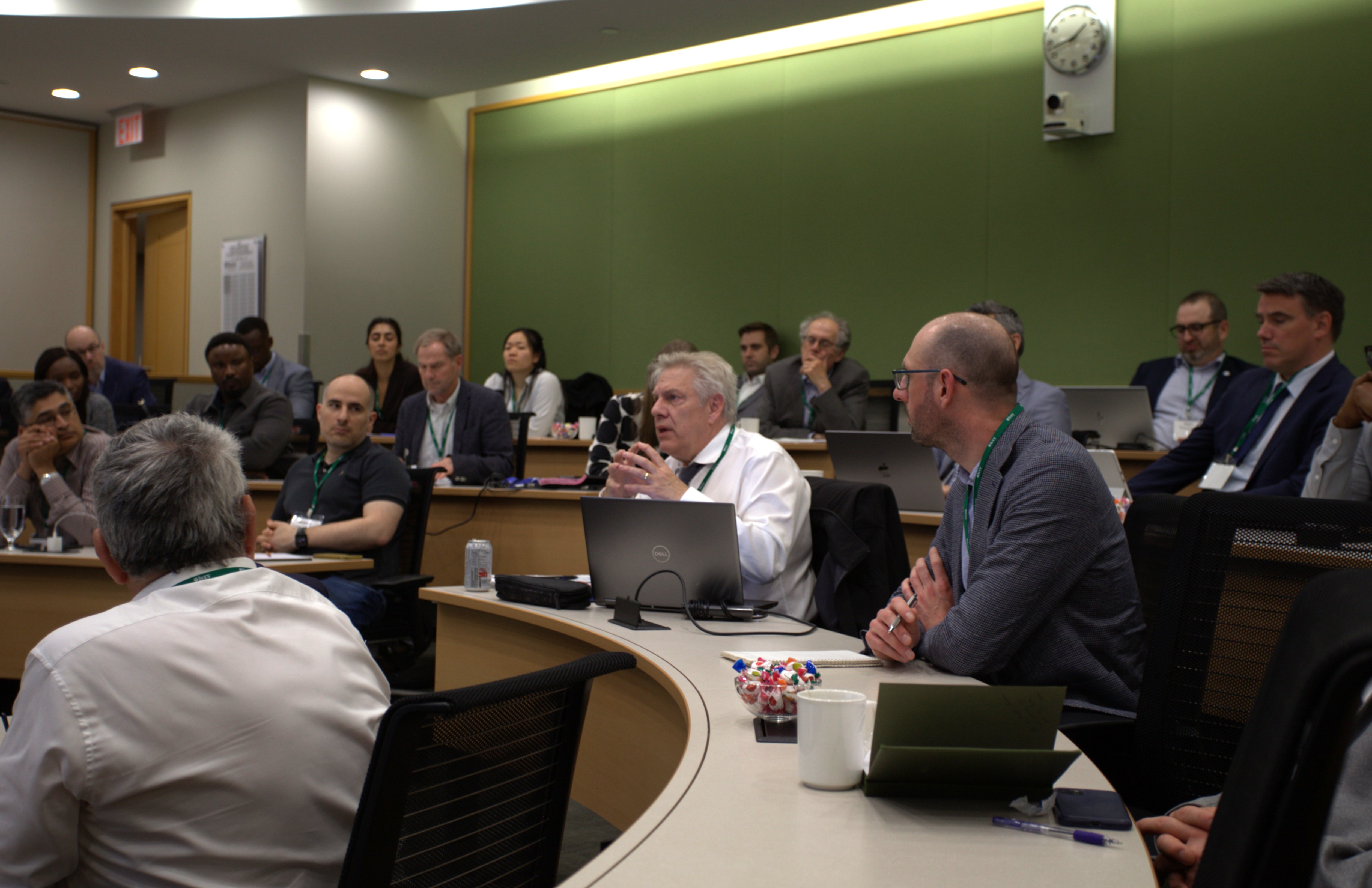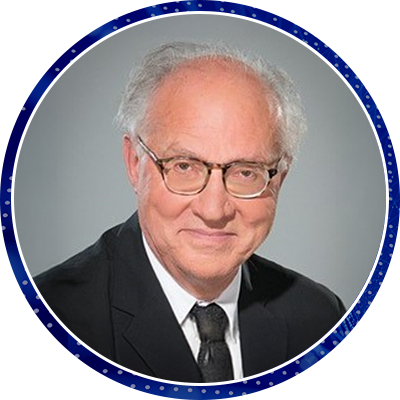"How can we design policy that supports the unexpected?” With this paradoxical question, Johannes Bauer, Director of the Quello Center at Michigan State University, opened the May 21 workshop titled “Innovation and Telecommunications Policy: Shaping Tech, Markets & Networks” at Ivey Donald K. Johnson Centre in Toronto.
Over 85 participants including policymakers, industry leaders, and academics attended the workshop convened by Ivey Professors Erik Bohlin, Chair in Telecommunications Economics, Policy and Regulation, and Romel Mostafa, Director of the Lawrence National Centre for Policy and Management.
As the fourth in a growing series of Ivey telecommunications policy dialogues, the workshop set out to examine how telecommunications, long treated as a utility, must now be understood as a foundational enabler of innovation. Drawing on his research, Bauer argued that traditional regulation, often locked between strict control and laissez-faire approaches, fails to capture the complexity of digital ecosystems today. Innovation, he emphasized, now emerges not from single breakthroughs but from dynamic interactions across platforms, services, infrastructure, and increasingly, artificial intelligence.
This reframing of telecommunications came at a timely moment, as Canada contends with persistent productivity challenges and rising geopolitical uncertainty—both of which underscore the urgency of policy approaches that enable experimentation and support innovation at scale.
Read a detailed breakdown of the workshop
Read the Canadian Press article featuring the workshop
Designing telecom for sustainability, sovereignty, and scale
As global pressures reshape technology governance, leading thinkers are reimagining telecommunications not only as infrastructure, but as a strategic driver of environmental resilience, national sovereignty, and inclusive growth.
Marja Matinmikko-Blue, Director of Sustainability and Regulation at Finland’s 6G Flagship, shared how Finland is embedding environmental, social, and economic goals into the core of its next-generation network research. Drawing on the country’s collaborative 6G ecosystem, she emphasized flexible spectrum access and inclusive network models, especially for underserved rural and remote communities, community-led networks, and vertical-specific operators.
Maria Alessandra Rossi, Associate Professor of Economic Policy at the University of Chieti-Pescara, offered insight into Europe’s pivot from generic industrial policy to targeted, technology-specific interventions. She underscored the growing consensus that telecom must be treated as a general-purpose enabler of industrial transformation: one that demands early coordination and cross-sector integration. While European policymakers are advancing a strategy of “open strategic autonomy” to bolster technological sovereignty, Rossi cautioned that this shift risks deepening internal inequalities, as wealthier member states are better positioned to co-finance EU-supported initiatives.
Finally, Georg Serentschy, Managing Partner at Serentschy Advisory Services, explored the implications of quantum communication for network security and digital sovereignty. With Canada and the EU both advancing national quantum strategies, Serentschy emphasized that digital sovereignty must be embedded into the design of next-generation systems from the outset. He argued that quantum technologies, particularly quantum key distribution (QKD), represent a transformative shift in securing communications infrastructure for protecting sensitive data across finance, defense, and energy—one urgently needed in light of rising geopolitical tensions, cyber threats, and dependencies on foreign digital platforms.
Market Reform and Infrastructure Decoupling
As cloud, AI, and software-defined networks reshape telecom architecture, legacy market models are coming under pressure.
Gérard Pogorel, Professor Emeritus at Télécom Paris, explored how network virtualization is reshaping the fundamentals of telecom policy, particularly in Europe’s fragmented regulatory landscape. As telecommunications functions increasingly decouple from physical infrastructure—enabled by software-driven management tools and cloud-based operations, new service models are emerging that challenge traditional assumptions about innovation and ownership. Pogorel argued that this disaggregation is not only altering market dynamics but also accelerating the shift from infrastructure-heavy “TelCos” to agile, service-oriented “TechCos.”
Peter Cramton, Professor Emeritus at the University of Maryland, proposed a new paradigm for wireless innovation built around open access and dynamic wholesale markets. Drawing parallels to electricity markets, he argued that telecommunications should be treated as a time- and location-sensitive commodity, with flexible, real-time pricing and forward trading enabling more efficient use of infrastructure and spectrum. As market consolidation increases and building parallel networks becomes economically unsustainable, Cramton advocated for regulated wholesale access, allowing virtual operators to compete and innovate without owning physical assets. This model, he suggested, would unlock new value creation and reduce congestion through dynamic allocation mechanisms.
Panel Discussion: Innovation and Technology Adoption in Canada
A panel discussion followed, moderated by Romel Mostafa, bringing together voices from investment, enterprise telecom, and sectoral innovation. Together, they explored how Canada can move from infrastructure build-out to meaningful adoption and value creation across sectors.
Salim Teja, Partner at Radical Ventures, shared how Canada’s AI investment trajectory is shifting. While early investments focused on infrastructure like chips, data centers, and foundational models, the frontier has now moved to the application layer. The most transformative AI use cases, he noted, demand not just data and compute power, but also low-latency, scalable telecommunications infrastructure. Canadian companies like Promise Robotics and Aspect Biosystems exemplify how domestic innovation can scale globally, but only if the foundational infrastructure and policy environment keep pace.
Peter Wilcox, Director of Enterprise Wireless Products & Services at Bell, emphasized that innovation must begin with real-world problems, not just emerging technologies. Bell’s partnerships with clients in mining and public safety sectors demonstrate how private 5G and LTE-M networks enable electrification, automation, and semi-autonomous operations in challenging environments. Wilcox stressed the importance of co-developing solutions with enterprise users and creating trusted, transparent ecosystems that allow for open innovation and interoperability.
Carlos Cabrero, Director at TELUS Agriculture and Consumer Goods, shared how TELUS is leveraging its telecom backbone to fuel purpose-led innovation. In sectors often left out of tech conversations like agriculture and healthcare, the company is delivering platforms that streamline electronic medical records and support precision farming. He stressed that many smaller producers live in rural areas, where high-speed connectivity remains a critical barrier.
Furthermore, the panelists shared common concerns about Canada’s broader innovation strategy. As the country expands investment across a growing list of “critical” technologies, there is a risk of diluting impact by spreading resources too thin. The lack of early, coordinated standardization is an area where the EU’s experience offers a cautionary tale. Without clear standards and interoperability, Canadian initiatives may struggle with inefficiencies and limited scalability, particularly when aiming to compete or collaborate internationally.

Reimagining the Telecommunications Ecosystem
Greg Lang, Senior Strategic Officer at the CRTC, closed the workshop with a clear-eyed look at what Canada’s regulatory institutions must do next.
Lang endorsed calls for deeper innovation analysis and support for dynamic pricing models but pointed to cultural and structural hurdles within Canadian regulation. A key gap, he noted, is the lack of international benchmarking, especially compared to areas like competition law. Telecom regulation, he argued, often unfolds in isolation. Events like this help fill that gap by bringing comparative insights and surfacing practical feedback beyond formal consultations. Crucially, Lang urged industry stakeholders to proactively share what’s working—and what isn’t—so that regulators can ground their decisions in real-world experience.
The workshop underscored that Canadian telecommunications policy is entering a new chapter that calls for strategic clarity, cross-sector collaboration, and a commitment to learning from both domestic experience and international best practices. Canada’s policy trajectory is not about choosing between innovation and access but about building a flexible and resilient ecosystem where both can thrive.
This article was written by Noor Us Sahar (MSC ‘25), Bianca Bhardwaj (HBA ‘25), Ray Wang (HBA ‘25), and Amanda Bano (HBA ’24) with editorial support from Zsofia Agoston Villalba, LNC Policy and Communications Specialist.
The Ivey Telecom Workshops are co-funded by the Lawrence National Centre for Policy and Management and the Ivey Chair in Telecommunication Economics, Policy and Regulation. The Centre gratefully acknowledges the generous support of the Power Corporation of Canada, the Jack Lawrence Family, and the Mitchell and Kathryn Baran Family Foundation. The Chair is funded by Ivey Business School as well as by support, from Bell Canada and TELUS, to Western University.
Speakers and Presentations

Johannes Bauer
Professor and Director, Quello Center, Michigan State University, USA
View presentation material (PDF)

Erik Bohlin
Professor, Ivey Business School, and Ivey Chair in Telecommunication Economics, Policy and Regulation, Canada

Carlos Cabrero
Director, Customer Experience Excellence, TELUS Agriculture and Consumer Goods

Peter Cramton
Emeritus Professor, University of Maryland, USA
View presentation material (PDF)

Greg Lang
Senior Strategic Advisor, Office of the Vice-President, CRTC, Canada

Marja Matinmikko-Blue
Adjunct Professor, Oulu University & Director, Sustainability and Regulation, 6G Flagship, Finland
View presentation material (PDF)

Romel Mostafa
Director, Lawrence National Centre for Policy and Management, Ivey Business School, Canada

Gérard Pogorel
Professor Emeritus, Télécom Paris, France
View presentation material (PDF)

Maria Alessandra Rossi
Associate Professor of Economic Policy, University G. D'Annunzio of Chieti-Pescara, Italy
View presentation material (PDF)

Georg Serentschy
Serentschy Advisory Services, Austria
View presentation material (PDF)

Salim Teja
Partner, Radical Ventures, Canada

Peter Wilcox
Director, Enterprise Wireless Products & Services, Bell
View presentation material (PDF)
